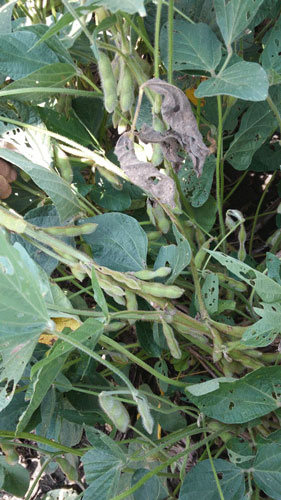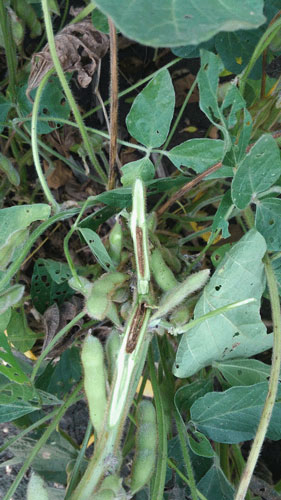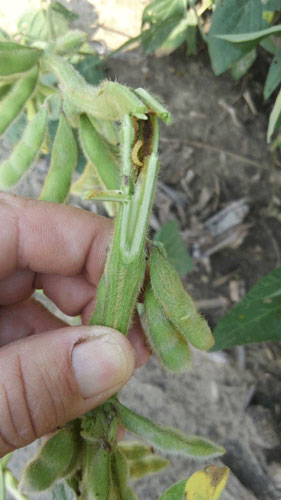The Dectes stem borer (Dectes texanus LeConte) is native to Kansas and can infest soybeans and sunflowers. The adult is a gray, long horned beetle that lays eggs in a soybean plant. The larvae hatch and tunnel into the soybean stem where the petiole of the leaf attaches, then proceed to tunnel down the stem. This tunneling usually goes through the pith to the base of the plant where the larva girdle the inside of the stem. This girdling weakens the stem, making the plant very susceptible to lodging, which may result in harvest losses. Scouting for the incidence of Dectes while the soybeans are still green can assist in helping avoid more loss of yield at harvest. Harvesting soybeans as early as possible can help reduce yield losses and is the best management tactic. The longer infested plants remain in the field, the longer they are exposed to wind that can break the girdled stem.
The first step in scouting for Dectes-infested plants is to look for a single trifoliate in a plant that is dead (Figure 1). It is much easier to find the dead trifoliates if the rest of the leaves are green and have not started to yellow with natural senescence. Breaking off the dead petiole will expose the hole tunneled into the stem. Splitting the stem at this node will show the browning of the pith caused by the Dectes larva as it tunnels (Figure 2). Continuing to split the stem down the plant will expose the larva that caused the damage (Figure 3). Fields with higher incidence of infested plants can be targeted for earlier harvest to help reduce yield losses due to these lodged plants.

Figure 1. Signs of dead trifoliates in soybeans infested with Dectes stem borers. Photo by Eric Adee, K-State Research and Extension.

Figure 2. Browning of the pith caused by Dectes stem borer in a soybean stem. Photo by Eric Adee, K-State Research and Extension.

Figure 3. Dectes stem borer larva in a soybean plant. Photo by Eric Adee, K-State Research and Extension.
For more information on the Dectes stem borer, please read the KSRE publication MF 2581, “Dectes Stem Borer: Kansas Crop Pests”, at https://www.bookstore.ksre.ksu.edu/pubs/MF2581.pdf
Eric Adee, Agronomist-in-Charge, Kansas River Valley and East Central Experiment Fields
eadee@ksu.edu
Jeff Whitworth, Extension Entomologist
jwhitwor@ksu.edu
Tags: soybeans insects dectes stem borer